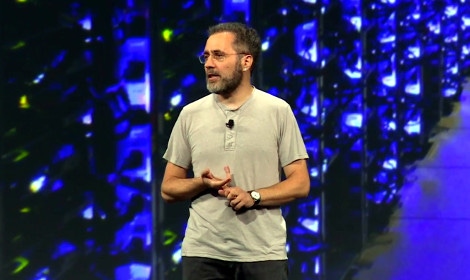IBM, Microsoft, Red Hat Join Google's Open Source Container Management Project KubernetesIBM, Microsoft, Red Hat Join Google's Open Source Container Management Project Kubernetes
Docker container management system gets support from the IT big league as well as a group of leading startups
July 10, 2014

Kubernetes, the open source container management project announced by Google in June, is seeing strong support. IBM, Red Hat and Microsoft, as well as well-hyped startups CoreOS and Mesosphere are now supporting and contributing to Kubernetes. A company called SaltStack, which is building a container automation framework for cross-cloud portability, has also come on board, as well as Docker, which has built the full container stack as a product,
With Kubernetes, Google draws on its experience in efficiently building and deploying powerful apps like Search, Gmail and Maps over its massive cloud infrastructure. Kubernetes was once proprietary, but now several big players are participating and evolving themselves with the Docker container management tech. Docker recently launched 1.0 and has brought the container buzz to the front of the industry.
Containers are lightweight and easy to move around. They comprise just application and its dependencies, whereas a virtual machine has to store a guest operating system in addition to binaries and libraries. Kubernetes is designed for Docker container management at scale. What’s notable are the names of the companies now contributing to it. competitors are holding hands and banking on the same project. However, there’s always the “too many cooks spoil the pot” problem to watch out for, as agendas might not necessarily line up.
The hope for the Kubernetes project is to help users easily launch Docker containers onto a cluster of servers through better management. It’s comparable to Docker’s project Libswarm, which Docker is ensuring is aligned with the project.
IBM is looking to Kubernetes to help customers launch applications across multiple clouds. Red Hat sees it as a way to push hybrid environments and easily moving back and forth from private and public clouds. Microsoft talks about giving customers choice about what they run in its Azure cloud. Google most likely sees it as a way to make its latecomer Compute Engine stand out. CoreOS is making sure its operating system for distributed architectures works with Kubernetes, which is built on etcd, CoreOS' service discovery tool. Google's software engineer Brendan Burns tweeted about how much he likes etcd yesterday.
“Each company brings unique strengths, and together we will ensure that Kubernetes is a strong and open container management framework for any application and in any environment - whether in a private, public or hybrid cloud,” wrote Urs Hölzle, senior vice president for technical infrastructure at Google.
Google made its commitment to open container standards in June when it open sourced Kubernetes. “Everything at Google, from Search to Gmail, is packaged and run in a Linux container,” wrote Eric Brewer, vice president of infrastructure at Google. “Each week we launch more than 2 billion container instances across our global data centers, and the power of containers has enabled both more reliable services and higher, more-efficient scalability. Now we’re taking another step toward making those capabilities available to developers everywhere.”
“Predictable deployments and simple scalability are possible because Docker packages all of a workload’s dependencies with the application,” wrote Hölzle.
This allows for ultimate portability; you can avoid vendor lock-in and run containers in the cloud of your choice. It is just as important that the management framework has the same properties of portability and scalability, and that is what the community will bring to Kubernetes.
Read more about:
Google AlphabetAbout the Author
You May Also Like







